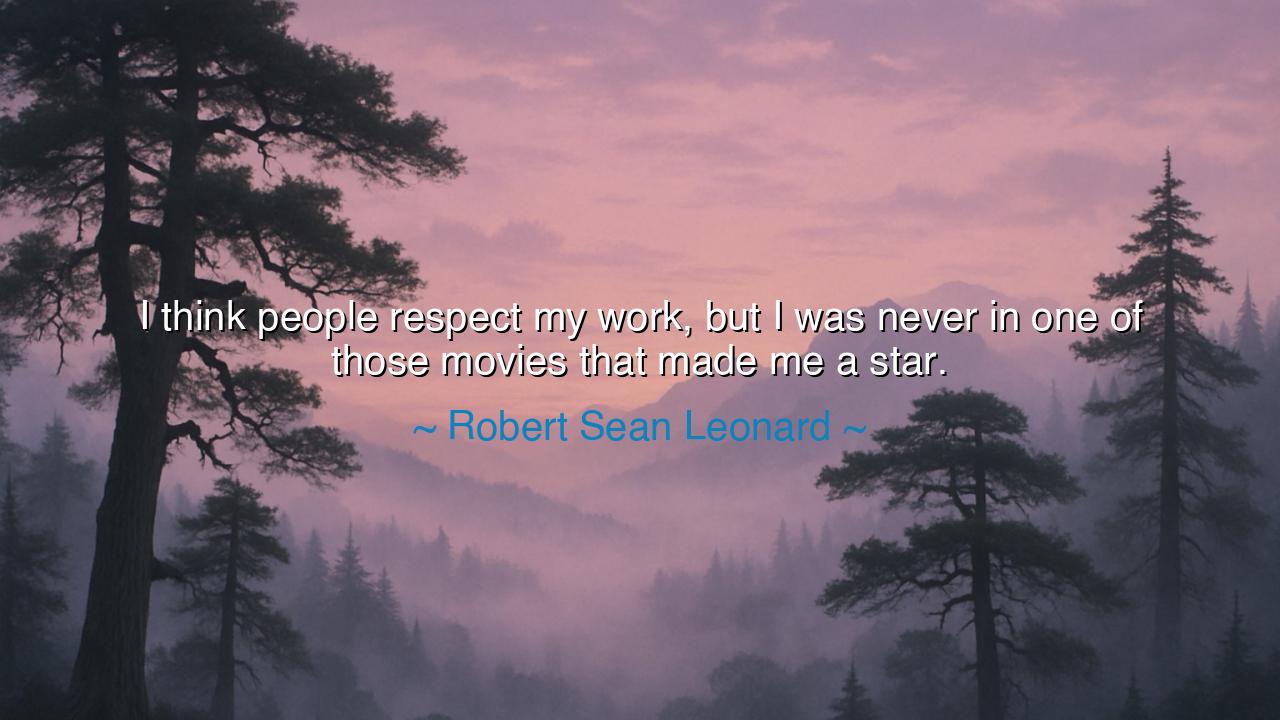
I think people respect my work, but I was never in one of those
I think people respect my work, but I was never in one of those movies that made me a star.






"I think people respect my work, but I was never in one of those movies that made me a star," reflects Robert Sean Leonard, and in these words, he offers a meditation on the nature of fame, recognition, and artistic integrity. His statement speaks not only to his own career but to a deeper, universal truth about the human desire for recognition and the often conflicting relationship between artistry and celebrity. While many seek the light of stardom, Leonard acknowledges a more quiet, yet equally valid, form of success—one rooted in the respect earned for the work itself, rather than the public acclaim that often follows fame.
In the ancient world, great heroes and philosophers often sought recognition, not for their fame, but for their deeds and the truths they uncovered. Socrates, perhaps the most famous of ancient philosophers, lived not for the accolades that his teachings would one day bring but for the pursuit of wisdom and virtue. Though he was not revered in his own time, his commitment to philosophy earned him respect, not as a star, but as a figure whose work transcended the transient nature of public fame. Socrates' dedication to integrity over stardom is a reminder that true respect is earned through substance—through the quality of one’s work and the impact it has on others, rather than the fleeting nature of fame.
Leonard’s words also echo a key teaching of the Stoics, who believed that one’s true self should not be tied to external validation. Epictetus, one of the foremost Stoic philosophers, taught that we must focus on what is within our control—our actions, our character, and our choices—while letting go of the desire for external approval. To the Stoics, fame was an illusion, a false goal that could distract from the pursuit of virtue. They believed that the highest form of respect came not from the admiration of others but from one’s own ethical conduct. In this sense, Leonard’s statement reflects a Stoic mindset: respect comes from the integrity of one’s work, not from the fleeting pursuit of recognition.
Moreover, there are countless figures throughout history who, like Leonard, never sought stardom, but whose work and legacy live on as lasting monuments to their true genius. Vincent van Gogh, for instance, spent most of his life in obscurity, never receiving the fame he deserved. He worked tirelessly, creating masterpieces that would later change the course of art history. In his lifetime, his name was not a star; it was the value of his work that would echo through the ages. Van Gogh’s story serves as a poignant reminder that true greatness is often not defined by the immediate recognition one receives but by the lasting impact their work has on the world.
Leonard’s humility speaks to the quiet strength of choosing authenticity over celebrity. His work may not have made him a household name, but it has earned him the respect of those who appreciate the craft of acting—the artistry of embodying a role, the dedication to a craft that transcends the superficiality of fame. Like the great philosophers or artists of the past, his value is not in the applause but in the meaning and depth his performances bring to others. There is an ancient wisdom in understanding that respect does not always come with the bright lights of fame; sometimes, it is the quieter moments—the ones where we stand by our values—that speak the loudest.
The lesson here is clear: the pursuit of fame can easily lead us astray, distracting us from what truly matters—the integrity of our work and the genuine respect we earn through our actions. In a world obsessed with the allure of stardom, Robert Sean Leonard reminds us that there is greater dignity in working for the love of the craft than for the fleeting thrill of recognition. Fame may be momentary, but the respect earned through hard work, authenticity, and humility is enduring.
Therefore, let us reflect on the wisdom of Leonard’s words and the lessons they hold. Let us strive for excellence, not for the sake of fame, but because the work itself is worthy of respect. Let us remember that greatness does not come from being seen by the world but from the impact we make, from the lives we touch, and from the legacy we leave behind. In this, we find true fulfillment and a respect that outlasts the ephemeral nature of celebrity.






AAdministratorAdministrator
Welcome, honored guests. Please leave a comment, we will respond soon